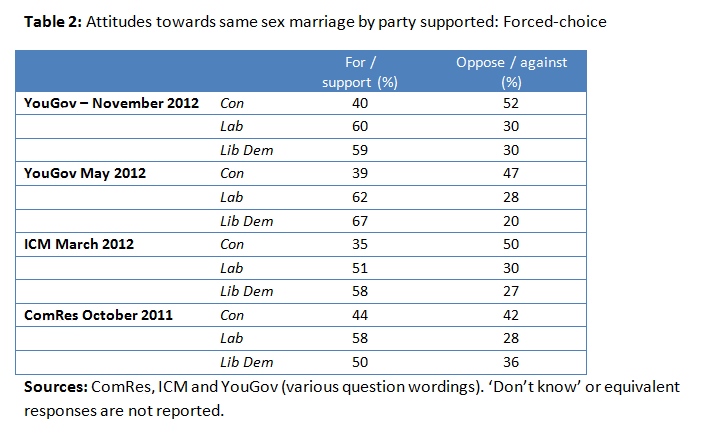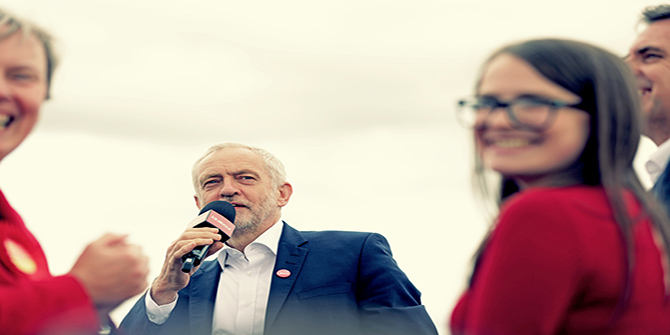 The Minister for Women and Equalities, Maria Miller, made a statement to Parliament yesterday about gay marriage. Following this Ben Clements analyses the attitudes towards gay marriage among party supporters and finds that party affiliation is a clear dividing line in public opinion on this issue.
The Minister for Women and Equalities, Maria Miller, made a statement to Parliament yesterday about gay marriage. Following this Ben Clements analyses the attitudes towards gay marriage among party supporters and finds that party affiliation is a clear dividing line in public opinion on this issue.
The leaders of the three main parties – Conservative, Labour and Liberal Democrat – have publicly declared their support for the current proposal to legalise marriage for same sex couples in civil ceremonies. While this specific proposal did not feature in the Conservative Party’s 2010 general election manifesto, David Cameron declared at the 2011 autumn party conference that ‘I don’t support gay marriage despite being a Conservative. I support gay marriage because I’m a Conservative’. There is, however, significant opposition to the gay marriage proposals within the Conservative Party, both the parliamentary party and extra-parliamentary party. As of June 2012, 233 MPs had declared themselves in favour of gay marriage, with 56 against, of whom 44 were Conservative MPs. A recent newspaper article found that at least a 100 Conservative MPs had written to constituents expressing concern or opposition to the proposals. On the other side of the debate, 19 senior Tories, including Boris Johnson and Michael Gove, have just set up a campaign group in favour of the legalisation of gay marriage. In the extra-parliamentary party, a ComRes survey of constituency chairmen found that 71 per cent wanted the proposals to be abandoned, while nearly half said their local party had lost members over the issue.
Many Conservative MPs oppose the gay marriage reform outright – on religious or moral grounds – or, or on pragmatic grounds, do not regard it as a pressing issue for their constituents or the wider public at a time when Britain is experiencing prolonged economic difficulties and major welfare and public service reforms. Under David Cameron’s predecessors, parliamentary votes on gay equality issues witnessed significant rebellions and ineptitude in party management. Indeed, the principal divide in the contemporary party is over social and moral issues. Under David Cameron, the often-labelled ‘nasty party’ has made efforts to liberalise its policies and image on gay rights, including public apologies for the ‘Section 28’ legislation and support for civil partnerships introduced under New Labour.
Despite the changes in policy and image under Cameron’s leadership, recent opinion surveys by the campaign group Stonewall have shown that only a small minority think that the Conservative Party is the most gay-friendly (22 per cent said this in 2012 compared to 26 per cent in 2007), lagging behind both Labour and the Liberal Democrats. Previous scholarly research has shown that Conservative supporters held more disapproving views towards same sex couples and gay rights issues in the 1980s and 1990s. Sharp differences of view amongst Republicans and Democrats on gay marriage and civil unions have been repeatedly shown in US opinion polls undertaken by organisations such as the Pew Forum on Religion & Public Life and Gallup. However, there has been little recent analysis of the attitudes of party supporters on gay rights issues, in particular whether Conservative Party supporters hold distinctive – and less liberal – views. Given this wider context, this post looks at the attitudes of party supporters in Britain towards the current proposals for gay marriage. It focuses on the supporters of the three main parties: Conservative, Labour and Liberal Democrat.
Since the question wording and response options used by different surveys and polling organisation can affect the level of expressed support or opposition for a particular policy proposal, as has been discussed elsewhere in relation to public attitudes towards gay marriage, the data reported here are twofold. First, Table 1 shows the attitudes of party supporters on the question of the legal recognition of same sex couples. Data are shown from an identical question carried in several YouGov surveys from 2011-12 (Angus Reid has also polled British opinion using a similar set of response categories but data are not available by partisanship). This question offered three substantive response options: support for same-sex marriage; support only for civil partnerships; and opposition to legal recognition of same sex relationships. Party support is measured by current vote intention.
Overall, Conservative supporters are least likely to favour gay marriage, and more likely to oppose any form of legal recognition. The greater level of opposition for Conservative supporters reflects the substantial opposition to gay marriage evident amongst the party’s MPs at Westminster. Across the polls, the mean levels of support for gay marriage are 32 per cent for Conservative supporters, 50 per cent for Labour supporters and 55 per cent for Liberal Democrat supporters. When a similar question was asked in the 2008 British Social attitudes survey, with equivalent response options, levels of support were lower for supporters of all three political parties. Specifically, 28 per cent of Conservatives, 37 per cent of Labour supporters and 38 per cent of Liberal Democrats believed that same sex couples should be allowed to marry legally. If we use the BSA 2008 as a benchmark level of support, then it is clear that support for same sex marriage has grown markedly amongst Labour and Liberal Democrat supporters but has only risen slightly within the Conservative grassroots.
Second, a number of national polls have appeared recently which have offered respondents a binary or ‘forced choice’ on the issue: in other words, are they for or against – do they support or oppose – gay marriage? Do these results also show that Conservative supporters are much less favourable than Labour or Liberal Democrat partisans towards gay marriage, broadly corroborating the findings from Table 1? Results are shown in Table 2 (with party support based on either current vote intention or vote choice in the 2010 general election). The results from all four polls, using various question wordings, consistently show that Conservative supporters are least likely to support gay marriage compared to Labour and Liberal Democrat supporters. With one exception (the ComRes poll from October 2011), Conservative supporters opposing gay marriage outnumber those in favour in every poll. In every poll, in contrast, a majority of Labour and Lib Dem supporters favour gay marriage. A ‘poll of polls’ calculation from Table 2 shows the mean level of support for gay marriage is 40 per cent for Conservative supporters, 58 per cent for Labour supporters and 59 per cent for Liberal Democrat supporters.
The attitudinal data compiled and examined above, based on recent data from major polling organisations using different question wording and response options, demonstrate that Conservative supporters are less likely to favour gay marriage compared to Labour and Liberal Democrat supporters. Party-political affiliation thus appears to forms a clear dividing line in public attitudes on this issue.
Note: This article gives the views of the author, and not the position of the British Politics and Policy blog, nor of the London School of Economics. Please read our comments policy before posting.
Dr Ben Clements is Lecturer in the Department of Politics and International Relations, University of Leicester. His research interests include public opinion on the EU and foreign policy issues; political participation in Britain; and religion in British politics. He is currently researching a monograph on the impact of religion on political attitudes and behaviour in Britain (for Palgrave Macmillan).








